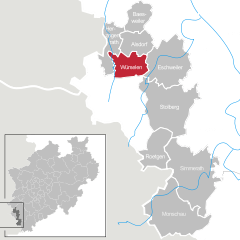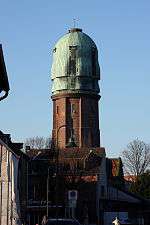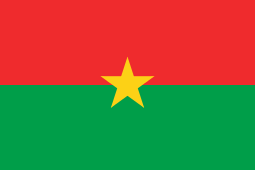Würselen
| Würselen | ||
|---|---|---|
|
San Sebastian Church | ||
| ||
 Würselen | ||
Location of Würselen within Aachen district 
 | ||
| Coordinates: 50°49′N 6°08′E / 50.817°N 6.133°ECoordinates: 50°49′N 6°08′E / 50.817°N 6.133°E | ||
| Country | Germany | |
| State | North Rhine-Westphalia | |
| Admin. region | Köln | |
| District | Aachen | |
| Government | ||
| • Mayor | Arno Nelles (SPD) | |
| Area | ||
| • Total | 34,385 km2 (13,276 sq mi) | |
| Population (2015-12-31)[1] | ||
| • Total | 38,962 | |
| • Density | 1.1/km2 (2.9/sq mi) | |
| Time zone | CET/CEST (UTC+1/+2) | |
| Postal codes | 52146 | |
| Dialling codes | 02405 | |
| Vehicle registration | AC | |
| Website | www.wuerselen.de | |
Würselen (Colognian: Wöschele) is a town in the borough of Aachen, in North Rhine-Westphalia, Germany.
Geography
Würselen lies north of the city of Aachen in the immediate vicinity of the tripoint of Belgium, Germany and the Netherlands. Its neighbouring settlements are, in clockwise order, the towns of Herzogenrath, Alsdorf and Eschweiler and the city of Aachen. Würselen is part of Aachen's Nordkreis quarter and is the only part of the city borough without external boundaries.
Subdivisions
As part of the administrative reform in North Rhine-Westphalia and the related 1971 Aachen Act, the territory of the borough of Würselen was expanded in 1972 to incorporate the hitherto independent municipalities of Bardenberg and Broichweiden. Since then Würselen has consisted of the following quarters:
- Bardenberg
- Broichweiden
- Würselen
These are subdivided in turn into the following parishes:
|
Würselen:
|
Broichweiden:
|
Bardenberg:
|
Coat of arms
The coat of arms show the eagle of the coat of arms of Aachen in the topleft corner. The second quarter shows the coat of arms of the Rhine Province, however the bend also represents the river Wurm which flows through the town. The mining tools in the third quarter remember the mining history of the town, which dates back till the 12th century. The cross in the fourth quarter is the symbol of the prince-bishopric of Cologne, as the town belonged to the archdiocese of Cologne until the creation of the diocese of Aachen.
History
During the time of the Roman Empire, Roman soldiers were based at Würselen, on an area today known as "Mauerfeldchen" (small mural field).
The first mention of the town was as Wormsalt in 870. Between 1265-69, Duke Wilhelm IV of Jülich built the castle of Wilhelmstein. Since 1616 the town has been known as Würselen. In 1972, the neighbouring municipalities of Bardenberg and Broichweiden were incorporated into the town.
Pictures


International relations
Würselen is twinned with:
-
 Hildburghausen (Thuringia, Germany)
Hildburghausen (Thuringia, Germany) -
 Morlaix (France)
Morlaix (France) -
 Réo Sanguié (Burkina Faso)
Réo Sanguié (Burkina Faso) -
 Campagnatico (Italy)
Campagnatico (Italy)
Sons and daughters of the city
- Jakob Dautzenberg (1897-1979), politician (KPD), resistance fighters against national socialism, Reichstag deputy
- Adolf Wamper (1901-1977), a German sculptor, created the Black Madonna in the War Crimes Camp 'Golden Mile'
- Joseph "Jupp" Derwall (1927-2007), football national player and trainer of the German national team (European champion 1980)
- Hans-Josef "Jupp" Kapellmann (born 1949), national football player (world champion 1974), player for among others at Alemannia Aachen, 1. FC Köln and FC Bayern München
- Nadine Capellmann (born 1965), dressage rider
- "Der Graf" ("The Count") (born 1970s), frontman & songwriter of the band Unheilig
- Torsten Frings (born 1976), football player, among others, Werder Bremen, Borussia Dortmund and FC Bayern München
- Norman Langen (born 1985), percussionist
- Yannick Gerhardt (born 1994), football player
References
- ↑ "Amtliche Bevölkerungszahlen". Landesbetrieb Information und Technik NRW (in German). 18 July 2016.
External links
- Official site (German)
Gallery
-

View from the Market towards St Sebastian
-

The former mine Teut with its Malakoff tower in 1880
-

Church of St Nicolas
-

Marienhoehe Hospital

